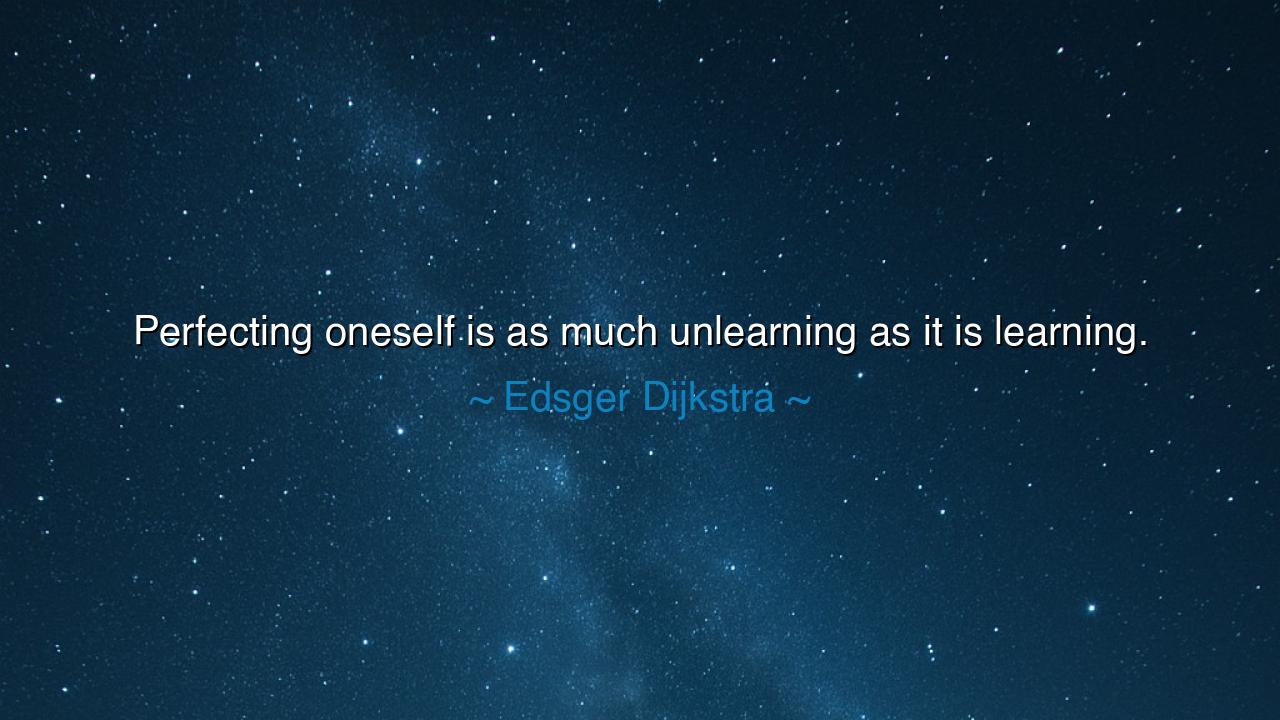
Perfecting oneself is as much unlearning as it is learning.






When Edsger Dijkstra said, “Perfecting oneself is as much unlearning as it is learning,” he unveiled one of the deepest truths of human growth — that wisdom is not only the gathering of new knowledge, but the shedding of illusion. To perfect the self is not to endlessly add, but to subtract; not to collect, but to cleanse. The journey to mastery, whether in life or craft, is as much about unburdening the mind of what is false, shallow, or conditioned as it is about acquiring skill or understanding. The ancients knew this: the sculptor does not create by adding clay, but by chipping away at the stone until the hidden figure emerges.
In his time, Dijkstra was known as one of the greatest minds in computer science — a man who sought elegance and simplicity in the realm of logic. Yet this quote transcends his field. It reflects a universal truth about the human mind, which, like a tangled garden, must often be cleared before it can grow anew. Each of us inherits not only wisdom but also confusion — beliefs shaped by fear, pride, and habit. The work of unlearning is to tear away these vines so that the roots of clarity may breathe again. In that labor lies the true art of self-perfection.
Consider the life of Siddhartha Gautama, the Buddha. Before he attained enlightenment, he had studied under great teachers, mastered philosophy, and endured severe austerities. Yet, in the end, it was not more knowledge that set him free, but the unlearning of attachment — the release of false desires and rigid doctrines. When he abandoned extremes and sat beneath the Bodhi tree in stillness, he discovered the truth that had always been within him. The awakening came not through adding more, but through letting go. In that moment, he embodied what Dijkstra meant: perfection is not achieved by filling the cup, but by emptying it.
Likewise, the philosopher Socrates taught that the beginning of wisdom is the admission of ignorance. To say “I know nothing” is not a confession of weakness, but an act of purification. For only when the mind becomes humble, when it discards arrogance and assumption, can it receive truth. The proud man learns nothing; the humble man learns endlessly. Thus, unlearning is the first step toward seeing reality as it is — not through the lens of ego, but through the eye of understanding. The wisest souls are not those who know the most, but those who have freed themselves from what is false.
In our modern age, the mind is crowded with noise — opinions, comparisons, fears, and half-truths disguised as knowledge. We are trained to accumulate, to chase information, to measure worth by what we possess. Yet, as Dijkstra reminds us, true mastery lies in clarity, not clutter. The mind must be like still water: transparent, reflective, and deep. To reach such stillness, one must unlearn the rush, the pride, the endless striving for validation. Only then can the self begin to take its true shape — calm, balanced, and awake.
Unlearning also demands courage, for it means confronting the false comforts of old habits and familiar beliefs. The warrior who clings to yesterday’s victories cannot fight tomorrow’s battles. The artist who fears imperfection will never create something real. The thinker who refuses to doubt will never discover. To perfect oneself, therefore, is to break and rebuild, to die and be reborn many times in the same lifetime. Each act of unlearning is a shedding of skin — painful, but necessary for growth.
And so, the lesson of Dijkstra’s wisdom is this: seek not merely to know, but to understand through release. In your study, do not hoard; refine. In your beliefs, do not cling; question. In your actions, do not strive for more, but for better. Perfection is not an excess of knowledge, but the harmony of mind and spirit cleansed of error. The sage, the master, the truly wise — they are not heavy with learning, but light with truth.
Therefore, let each day be both a school and a purification. Learn what is true, and unlearn what no longer serves you. Strip away arrogance, fear, and pretense. In time, you will find what Dijkstra found — that self-perfection is not the art of addition, but the discipline of subtraction, until only the essential remains. And when only the essential remains, you will know yourself as you truly are — whole, clear, and complete.






AAdministratorAdministrator
Welcome, honored guests. Please leave a comment, we will respond soon